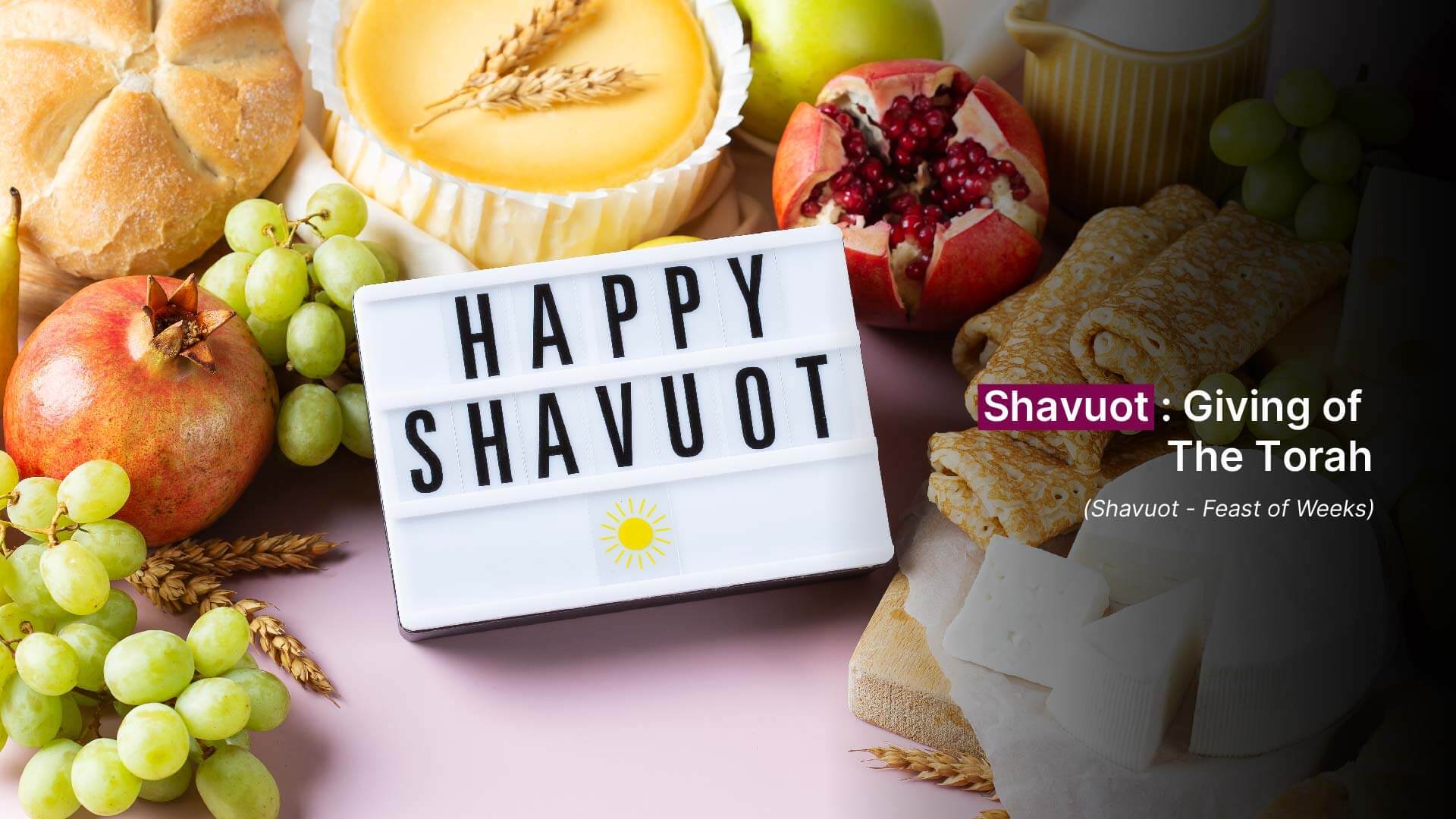
Shavuot or Festival of Weeks is a significant Jewish festival that commemorates the giving of the Torah at Mount Sinai.
The Shavuot festival is considered as one of the three “solemn feast”, it involves offering of wheat grains to the Lord, unlike the other two in which fruits and grapes & olive harvests are offered to the God to symbolize God’s provision to the Jews.
It also marks the conclusion of the Counting of the Omer in addition to grain harvest and giving of the Torah or Law at Mount Sinai after the exodus from Egypt
Shavuot or Festival of Weeks is celebrated every year exactly on the 50th day or seven weeks after the Feast of Pasch or Passover. It is observed on the 6th of Sivan (7th of Sivan outside Israel), Hebrew month, every year and falls in May or June according to the Gregorian calendar, because it is celebrated fifty days after Passover; the festival is also known as the Jewish feast of Pentecost.
The Jewish Holiday Shavuot: Where did it Begin?
The Shavuot holiday originally was a harvest holiday. People gathered at the Temple in Jerusalem with their agricultural offerings. During that time, the people brought their first harvests of their crops to the temple to offer to god.
As history continues, the temple was destroyed and the jewish people could no longer bring offerings. Talmudic rabbis reframed the holiday and ascribed Shavuot to the biblical story which recalls how after the exodus from Egypt the Israelites relocated to Mount Sinai in the desert. Moses ascended the mountain to meet God, who handed him the Ten Commandments, written on two tablets which were to be delivered to the israelites.
As per the Torah, when the Israelites arrived at Mount Sinai the holiday that was once purely agricultural became the commemoration of them receiving the Torah at Mount Sinai.
Celebrating Shavuot: Shavuot Traditions
The Jewish festival of Shavuot involves a lot of traditions and fun activities. Traditionally Shavuot is celebrated by studying the Torah all night, eating dairy, attending synagogue and reading the Book of Ruth, and refraining from participating in any work.
1. Studying the Torah- Learning the Shavuot Meaning
Shavout celebration begins with the reading of the Torah on the first night either all night or late into the night. It is customary to study the Torah all night in order to commemorate the anniversary of its giving. It also said that they read the Torah all night because in the morning that they were supposed to receive it, the people had overslept and in order to atone for having overslept many jews stayed awake all night reading the Torah.
2. Reading the Book of Ruth
The Book of Ruth is part of the bible known as ‘writings’ it is read during services on Shavuot. Ruth was a Moabite who married an Israeli man. After the death of her husband she followed her mother-in-law back to Israel and adopted the Jewish faith. Ruth is considered to be the archetype of the people that chose to convert to Judaism.
3. Decorating with Greens and Fresh Flowers
The custom of decorating with fresh flowers is followed as a reminder of the spring harvest and the ancient ritual of bringing the first fruits to the Temple. It also proves as a reminder of the legend that when the Jews arrived at Mount Sinai, they found it blooming with flowers and greenery.
4. Eating Dairy- The Feast of Shavuot
It is customary to eat dairy foods during the feast of Shavuot. It is done so as a reminder of the sweetness of Torah, and that the Torah calls the land of Israel a land ‘flowing with milk and honey’. Traditional Shavuot foods include cheese, cheesecake, blintzes and bourekas and more diverse options from around the world.
5. Yizkor Memorial Service
Yizkor is recited four times a year during holiday synagogue services, on Yom Kippur, on the eighth day of Passover, and the second day of Shavuot. Yizkor means “may god remember”, the purpose of its recital is to honor the deceased by committing to giving tzedakah (charity) in their memory, on the theory that the good deeds of the survivors elevate the souls of the departed.
6. Candle Lighting
Candle lighting is also a tradition followed on every holiday. On the first day of the festival, the candles can be lit anytime before the meal. If lit after sunset it must be lit with a pre-existing flame. Before the lighting of a candle, a prayer is recited by everyone and only after the prayer and thanking god they proceed further.
7. The Ten Commandments- The Pillars of Judaism
On the first day of Shavuot, it is customary to visit the synagogue to hear the reading of the 10 commandments which God had delivered on the 50th day of exodus to the people on Mount Sinai.
Torah Studies- D’var Torah for Shavuot
Shavuot is the day on which the giving of the Torah on Sinai. The reading of the Torah emphasizes the importance of lifelong learning and spiritual growth. The reading of the Torah is the most significant and important part of Shavuot festivities.
The story behind the practice of reading the Torah is still revered by the jewish community and the practice is a pillar of unity within the community itself. Practice of staying up all night to study the Torah on the first day is known as Tikkun Leil Shavuot and as I mentioned earlier, the practice is followed to atone the fact that the jews had overslept on the morning of the day they were to receive the Torah.
It can be enlightening to engage in meaningful Torah study during Shavuot and it can also help increase your focus and willpower, which can help you enrich your daily life.
What Does Shavuot Observance Look Like in the Modern World?
Today, for most American Jews Shavuot, although it holds a deep significance in the history of Judaism, doesn’t constitute a big-ticket holiday. When compared to Yom Kippur and Rosh Hashanah they tend to have more popularity. Jews have previously described the Torah as the word of God, and the Torah is still most significant in the religion.
In the contemporary world many American Jews began to neglect these traditional observances as many increasingly felt uncomfortable with a holiday that arose on the pretenses of a biblical revelation.
A new ceremony was introduced by Jews in Europe which offered a promising alternative called ‘confirmation’. Shavuot began to be associated with grand celebrations of children’s graduation from Jewish Sunday Schools. Children began to carry elaborate bouquets of flowers, an ode to the typical customs of Shavuot.
Winding Up:
The festival of Shavuot embraces spiritual renewal, gratitude and Torah Study. This Shavuot, embrace the opportunity to connect with your faith, heritage and community during this auspicious time of joy and celebration.
Celebrating festivals together is the best way to enrich the bond between family and community.
Why not celebrate the joyous festival of Shavuot with your family in the scenic mountains of Poconos?
We at HolidayKeepers offer a range of beautiful properties which are kosher friendly!
Reach out to us for any queries or booking requirements and have a joyous Shavuot!
With a decade of expertise in travel and hospitality, Aman Mehrotra, Senior Editor and Travel Manager at HolidayKeepers, is known for his compelling storytelling and insightful travel content. He skillfully combines strategic marketing wisdom with engaging narratives, covering everything from undiscovered destinations to the latest trends in vacation rentals. Aman’s writings resonate with both adventure enthusiasts and those seeking leisurely retreats. His global perspective and innovative approach make him a valuable asset to the HolidayKeepers team and a favorite among readers seeking inspiration and practical advice for their travels.




